Friday, October 14th, 1988
This is a new venture for me. A minibus trip, to Kent for a whole weekend. Surely we’ll get to see something. I am looking forward to a chance to see the famous Glossy Ibis:
I may possibly get a glimpse of Ring-necked Parakeet, if we’re lucky:
They’re a lot better close up:
There’s also a fair number of other birds scattered around the country and I start an exciting war of nerves in the minibus, trying to persuade everybody that it would be an extremely good idea to call in and see them all.
I have taken the unpardonable sin of producing a dozen photocopies of an article about the habits of the Stodmarsh Glossy Ibis. A lot of people who had up to now never heard of the bird, are soon warming to the idea of going to see it. A mention of the Isabelline Shrike however, is not quite as successful, since almost all my fellow passengers have a very accurate idea of just how far away Dorset is.
On the Saturday afternoon we move over to Stodmarsh, where by now, we all expect to see the Glossy Ibis, flying over our heads on its way to roost, as it is supposed to do every single night. It can be seen flying in over the Lampen Wall. But just what is a Lampen, and why do we need to be protected from it?
In the late afternoon, the reserve doesn’t really have a lot on show. I wait in vain for a Cetti’s Warbler, a bird, that to my eternal shame, I have yet to see, although I have heard a lot singing in Norfolk.
The Stodmarsh logbook by the car park says that the Ibis came in to roost at 4 o’clock the previous evening. That’s a bit of a frightening thought, because we don’t manage to get there until 4.15 and I have the horrible nagging feeling that we have all missed it .
The minutes tick by as we wait for the bird. We get more and more worried. At least, the
serious birdwatchers do. Some of our fellow travellers act as if there is a Glossy Ibis resident in every county in the British Isles, instead of just one single, lost, bird in the whole country.
4.45. Nothing
5.00. Nothing
We get so desperate that Paul puts into operation the ultimate birdwatching spell. He inserts his index finger into the handle of his tripod, followed by the whispered recital of the bird’s Latin name. The spell works a lot better if you haven’t looked up the Latin beforehand, but actually know it anyway.
And of course it works. Within a few short minutes, Wayne is shouting, “I think I’ve got it.”
And just for once, he is actually right.
The bird flies over, circles a few times, and finally drops down into the reeds, presumably into its roosting place.
It is supposed in all the books to be particularly primitive looking, but I think it’s absolutely superb. It has rounded wings which seemed almost transparent against the light of the sky, and its improbably long bill balances perfectly the dangling legs. And it is is nowhere near as awkward in flight as the descriptions would have you believe. It circles around us, light and graceful. It even earns a spontaneous round of applause from its admirers. It is certainly the best bird I’ve seen so far in my very short birdwatching career. Easily.
Nowadays, with the alleged advent of Global Warming, the Glossy Ibis, usually a bird of Southern Europe, is being seen with increased frequency in England. A little while back, one even came to spend a few weeks in a wet field down by the River Trent in Nottinghamshire:

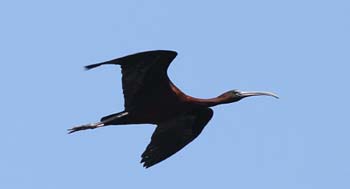
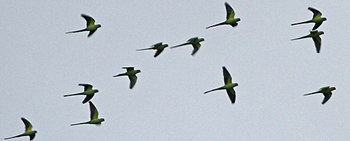
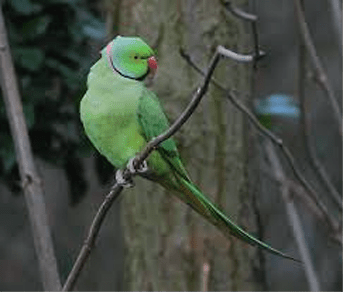
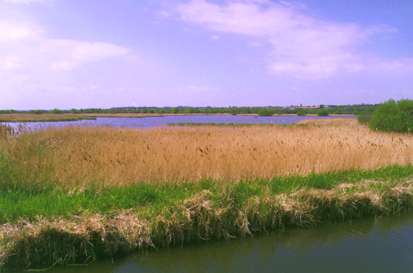

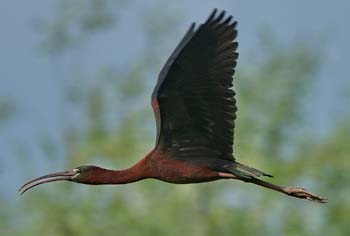




It must have been extremely satisfying to be rewarded with the sight of the Glossy Ibis John. Terrific post.
Thanks very much. The Ibis was certainly well worth the wait
It is a joy to see birds, they are so beautful. Thank you for sharing. Was this in 1988 ?
Yes, I think so. It was definitely in the late 80s which seems about five or six years ago to me now!
That Ibis is so majestic…I hope you get to see one in person. I used to have a moustache parakeet. It looked very much like the ring necked parakeet. After a time, I moved and left him with my father. He lived happily there for many years. The bird and his miniature schnauzer were excellent companions for him.
Yes, any bird of the parrot family makes a very intelligent companion although they do need a lot of attention because they normally live in flocks and they need to communicate with people. I can see that a dog would make an excellent friend for a parrot.
A fabulous creature, if not a little ungainly looking. I hope all that applause didn’t then frighten it away!
It didn’t on this occasion although the noise from large crowds has been known to flush birds. And you are absolutely right…it is an ungainly looking bird, very prehistoric looking. I think within five years or so they will be breeding here in England because they are becoming increasingly frequent. Somewhere quiet and wet like the Fens….
I shall keep my beady eye open for jt!
As global warming tends to move the weather patterns around a bit we will probably all see birds that are unfamiliar to us. And just maybe it will makes us more aware and more careful of their existence.Just maybe.
Let’s hope so! We always see a lot of interest over here whenever a rare bird is easily accessible and easy to see. The most frequent one would probably be the peregrine which is easily viewed on live webcams from cathedrals and high buildings all across the country. My hope is that our wildlife is not wiped out before most people even realise that it is there. I can imagine that being a possible problem in Australia, especially with all those useful creatures we gave you like cats, rabbits and foxes.
Yes. To play a little on the song from the Hitch hiker’s guide ……………..
.”So long and thanks for the cats and foxes and rabbits.
Great, informative, post, John
I love that beautiful red, what was the purpose of the lampen wall? Nice post John.
There was no Google to ask back in the 1980s. Apparently, “Built in the 1800s to help prevent flooding in the Grove Ferry area”…there’s a nice picture here…..http://www.geograph.org.uk/photo/1619446
I thought it might be for flooding. Thanks John.
Your passion for birds has intrigued me too. Lovely post and beautiful bird 🙂
Thank you! Animals are perhaps more spectacular but they are usually very difficult to see. Birds, though, are constant companions in our lives.
Agree 🙂
Great story about the Glossy Ibis – made better by the suspense before the final success.
We had two visits from a Ring-necked Parakeet at Screveton while we were on the farm. I love all the stories attached to them.
Yes, the parakeets do very well to survive in our climate. Apparently one of the best places to see them is in the evenings as they come in to roost at Esher Rugby Club in London. I found this article about them which is quite interesting..
https://www.pets4homes.co.uk/pet-advice/exotic-birds-living-wild-in-london-the-feral-london-parrots.html
Very interesting article, informative and well-balanced. I read about the Esher roost in the rugby press a few years ago, but that was mainly about the Health and Safety aspects and why parakeets should be culled.